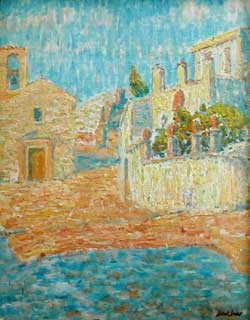
Meridiona lChurch, 1917
Talking about his country of adoption, Beer explained himself extensively shortly before his death:
Why this love for France ? The attachment to a people and a culture is not easy to explain. What I most admire in the character of the French nation is the individualism which is present everywhere in the French ethos and the French society. It’s an unwritten law, it’s constructed upon a sense of the individual responsibility and a clear understanding for the territory where the individual is allowed to express himself. For an artist who needs to express himself more than others, this liberty and this individualism are precious. Furthermore there exist in France a sense for clearness and logic which are the ultimate heritage from Greece and Rome. Stay away from excesses, keep reasonable, that’s often a French characteristic. So when we hear those pretending that communism is threatening to take power in France, it seems to me quite baroque if by communism we understand collectivism. We just have to know a little about French farmers, still representing the core of the population, to grasp to which extent they are attached to the land and their roots, and that’s quite the opposite of collectivism. But politics are not my business, art is. Art takes a lot of place in France which opened up for everybody. On this level there exist no narrow-minded nationalism. French art has its great traditions, with Poussin and the classics, and also with Delacroix and the romantics. Despite all the different movements, French art has a characteristic feature: le sens de la mesure. This is the belief in moderation, it’s the perception of harmony in beauty. A proper balance and rhythm. That is present still today. There is also the sense of sensitivity, if I may say so, a natural propensity for the artistic, wishing beauty to become perfect, in all its forms. I think that modern French art is trying to reconcile itself with the great tradition. We are a little tired of all these isms. We have to rediscover fundamental elements. Of course, art is the child of its time, it expresses what seems essential in a given epoch. Then what ? This is only an apparent paradox. It’s because of his internal life that the artist may put the worldly aspects above time and space, creating something universal. I am really convinced that our materialist time will be followed by another, struck by a profound religiousness, with the immense desire to restore what belongs to the soul. The rhythm of human existence implies that materialism should be followed by a new idealism, deriving from the need of a spiritual renaissance, on new bases.
“Next century will be religious or will not be”, said André Malraux, De Gaulle’s flamboyant minister of culture.
Dick Beer mentioned that already in the thirties as we saw but had also the courage to minimize the spiritual importance of avant-garde. In practical terms, he definitely contributed to a most French concept: “l’art pour l’art”.
By Robert Amberlin (© 2002)